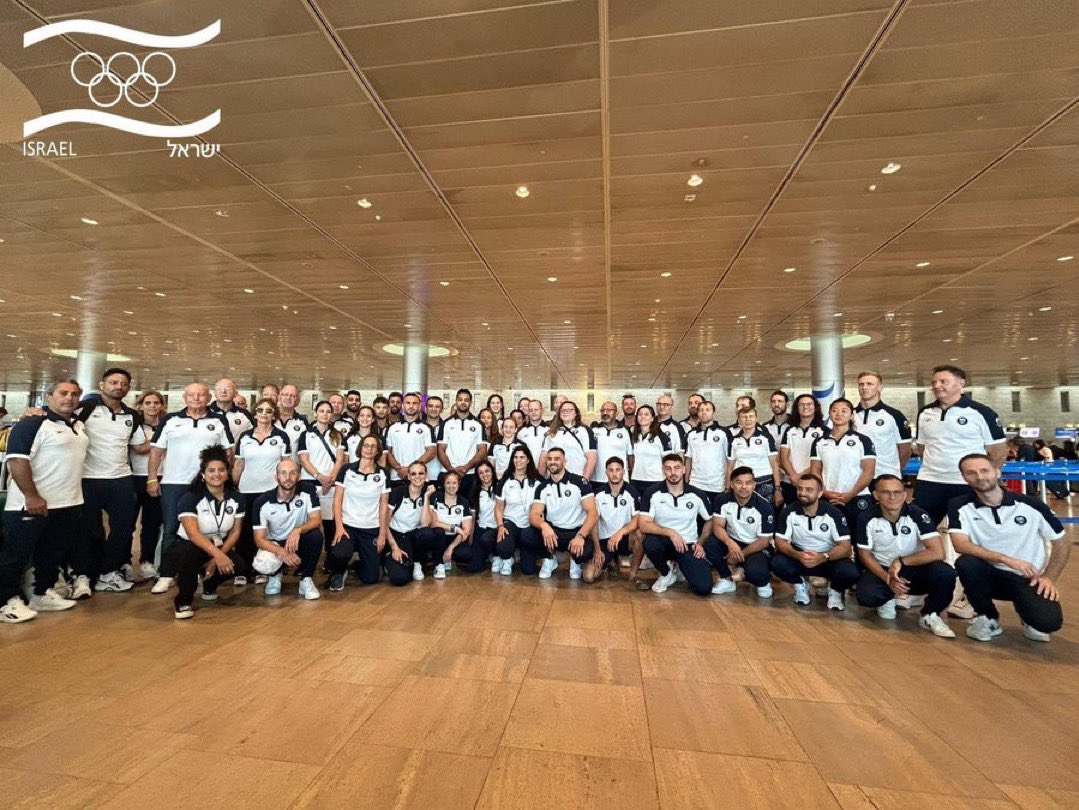88 Israelis Go for Gold in Paris

Michael Jacobs, July 24, 2024
Israel is sending 88 athletes to the 2024 Summer Olympics, officially opening Friday, July 26, in Paris. It’s the second-largest Israeli Olympic delegation ever, behind the 90 competitors at the last Summer Olympics in Tokyo.
The Tokyo Games, delayed from 2020 to 2021 because of COVID-19, also were Israel’s most successful: The team won two of the three golds and four of the 13 medals overall that the country has ever won. (Windsurfer Gal Fridman won Israel’s first gold in Athens in 2004.)
One of the Tokyo gold medalists, Artem Dolgopyat, is back to defend his title in the artistic gymnastics floor exercise. The other, rhythmic gymnastics all-around champion Linoy Ashram, has retired, but the Israeli team is one of the favorites after winning gold at the rhythmic gymnastics world championships last year.
Avishag Semberg, who took a bronze in taekwondo in Tokyo, is back, as are most members of the bronze-winning mixed judo team. They include Ukrainian-born Peter Paltchik, one of the Israeli flag bearers at the opening ceremony. The other flag bearer is American-born swimmer Andi Murez, competing in her third Olympics.
Six of Israel’s 13 Olympic medals have come in judo, including its first, a silver earned by Yael Arad in Barcelona in 1992. (Read more about a 2016 judo bronze medalist, Yarden Gerbi.) Arad, who dedicated that medal to the 11 Israelis killed 20 years earlier at the Munich Olympics, is now the president of the Israeli Olympic Committee. (Meet one of the 11 Munich martyrs, weightlifter Yossef Romano.)
The massacre in Munich led to years of Israeli secret operations to punish those behind the Black September plot, from a raid on Beirut in 1973 to a car bombing in Beirut in 1979, including one horrible mistake in Lillehammer, Norway, in 1973.
Twenty-one years later, Israel made a more positive appearance in Lillehammer when Misha Shmerkin became the country’s first competitor in the Winter Olympics, finishing 16th in men’s figure skating.
One of Arad’s Barcelona teammates, Oren Smadga, who took a bronze in judo in 1992, now is the head coach of the men’s judo team. Smadga is carrying out his duties in Paris at a painful time: His son, Sgt. 1st Class Omer Smadga, was killed in battle in Gaza on June 20.
The war against Hamas, of course, hangs over the Israeli delegation.
“Our first victory is that we’re here, that we didn’t give up, that since October 7 we’ve taken part in hundreds of competitions,” Arad said before most of the team left Israel on Monday, July 22, according to The Times of Israel. “Everything surrounding October 7 will be with us in our hearts.”
Amid a global surge in antisemitism, death threats to Israelis, a promise of “rivers of blood” in Paris and a French lawmaker’s declaration that Israelis aren’t welcome, France has pledged to provide around-the-clock protection for the Israeli team to prevent any repeat of Munich in 1972.
The first public test of that security comes Wednesday, two days before the opening ceremony, when the Israeli men’s soccer team opens play against Mali. It’s the first time since 1976 that Israel has qualified for the Olympic soccer tournament and is one of the reasons the Israeli delegation is so large.
Israel’s Tokyo squad also was boosted by a team sport: 24 players on the baseball roster. Baseball is not an Olympic sport in 2024.
The same effect was in play when Israel first competed in the Olympics in Helsinki in 1952: The men’s basketball team accounted for about half the delegation.
Israel almost entered the Olympics before statehood. Mandatory Palestine formed an Olympic committee in 1933, open to all athletes but specifically meant to represent the Jewish national home. The committee turned down an invitation to send a team to the 1936 Olympics, however, because they were held in Berlin under the Nazis.
The “Jewish Olympics,” the international Maccabiah Games, had already been held twice in the Land of Israel by 1936.
Nearly 400 Jewish athletes from around the world participated in the first Maccabiah Games in Tel Aviv in March 1932. A Jewish Agency meeting in January 1932 explored the pros and cons of launching the games.
The games were scheduled every three years to differentiate them from the Olympics.
More than 1,200 athletes from 28 countries participated in the 1935 Maccabiah Games, but the 1938 games were canceled because the British authorities, facing an Arab revolt and nearing a decision to cut off Jewish immigration the next year, worried that Maccabiah competitors would settle in Palestine.
The Maccabiah Games resumed in 1950. After the fourth games in 1953, the Maccabiah shifted to an Olympic-esque schedule of every four years from 1957 to 2017. One Maccabiah benefit: The 1965 games brought NBA first-round draft pick Tal Brody to Israel, and he liked it so much that he stayed and went on to play a key role in Maccabi Tel Aviv’s 1977 European basketball championship.
COVID contributed to a delay for the 21st Maccabiah Games until 2022, and the 22nd games are set for July 8 to 22, 2025.